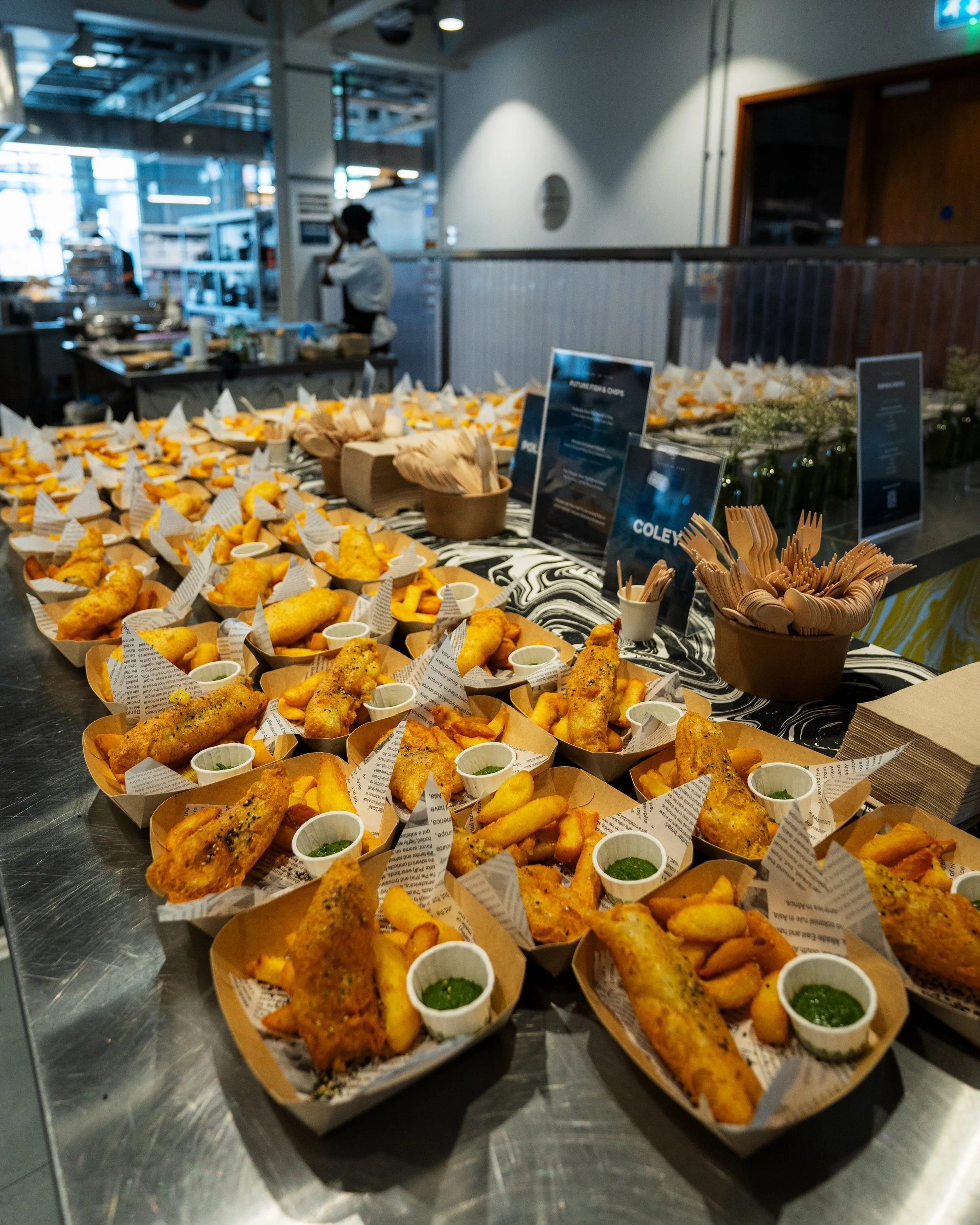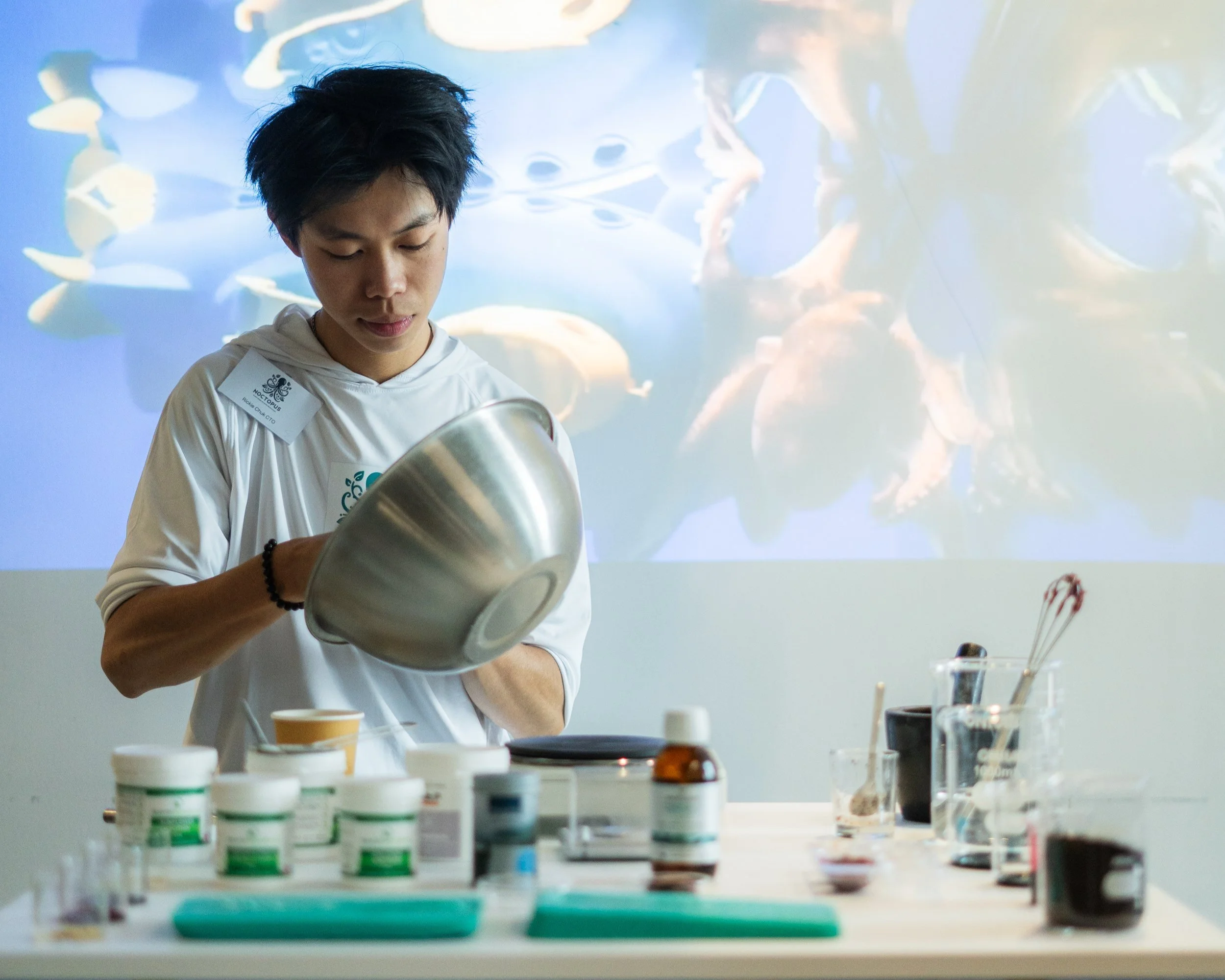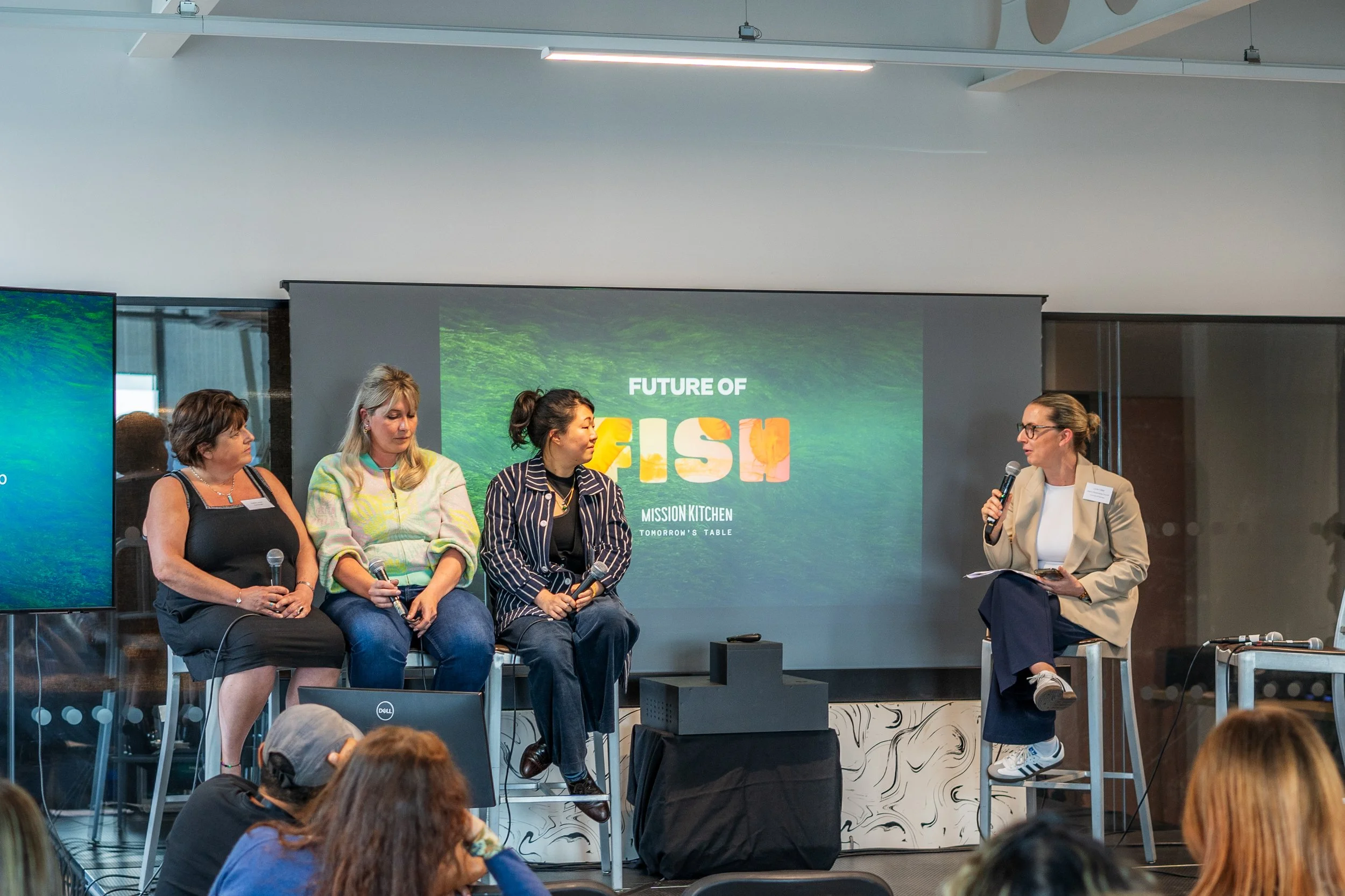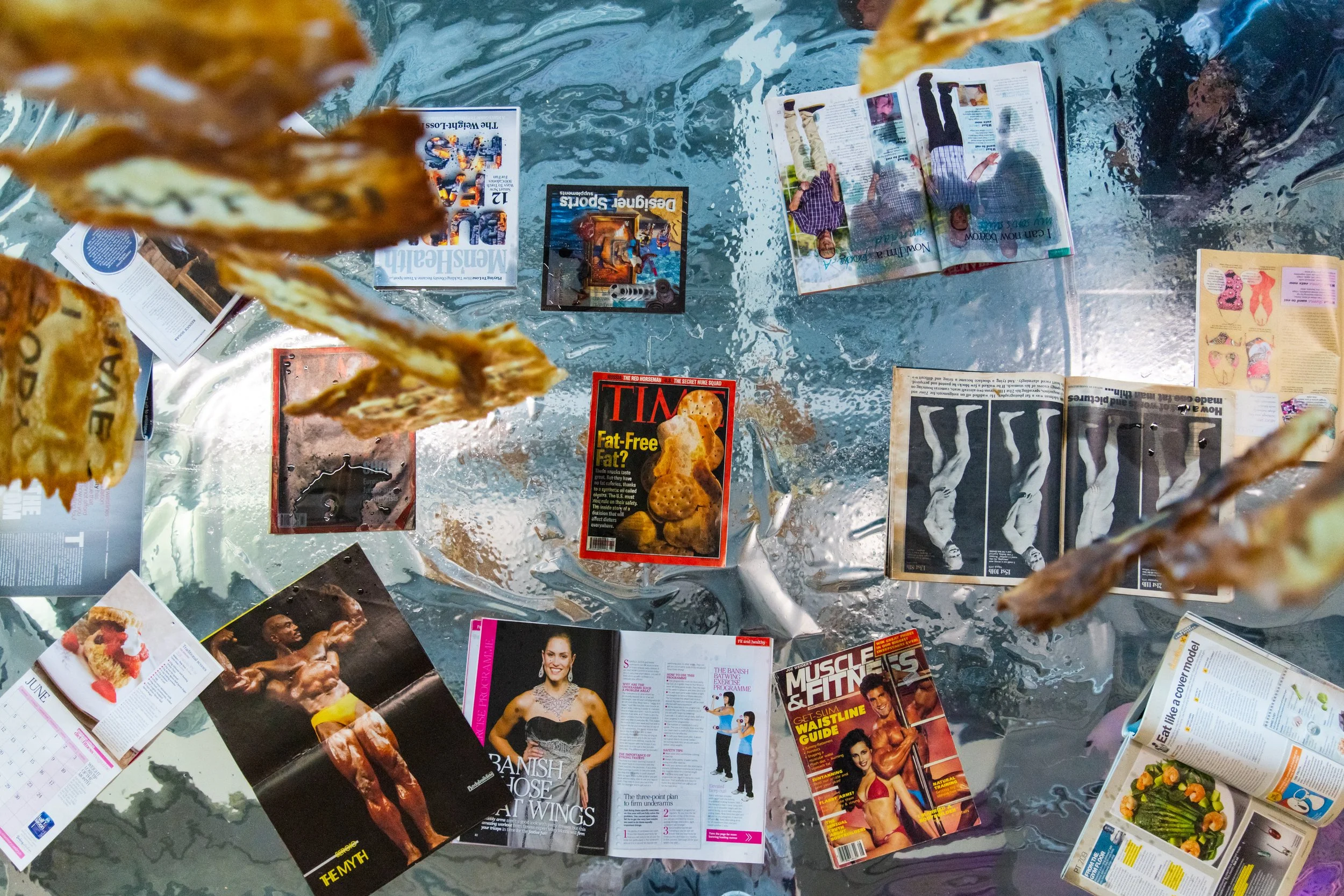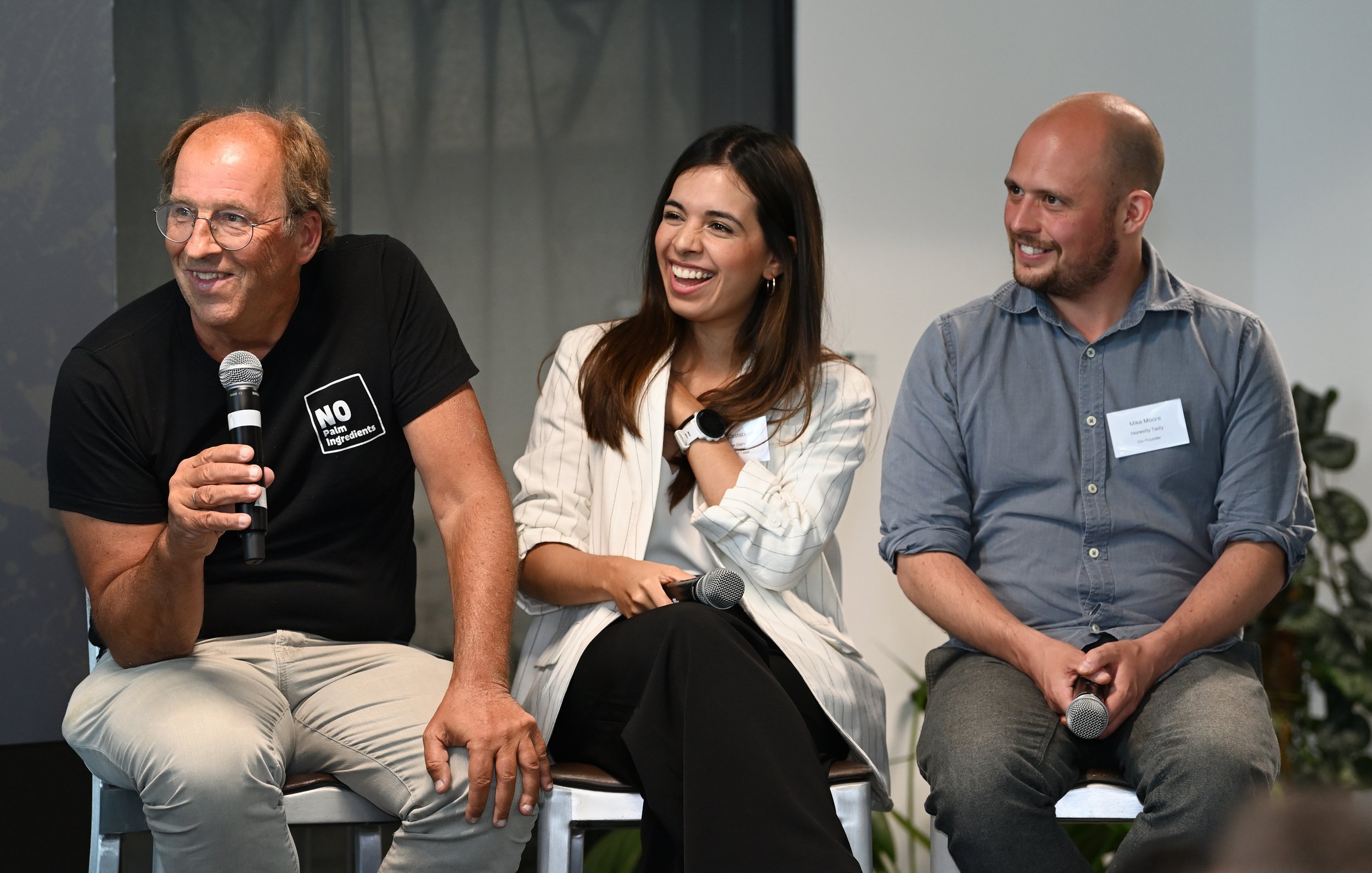Future of Fish: Debrief
Read the debrief on the Future of Fish
On 23rd May 2024, over 100 food founders, chefs, innovators and campaigners came together at Mission Kitchen for a day dedicated to discovering the Future of Fish & Seafood.
Some argue that the only sustainable future is one where humans cease eating fish altogether. But that vision is unrealistic, the sourcing and consumption of fish and seafood are deeply rooted in culture, identity, and livelihoods, and provide a vital source of protein for millions of people worldwide.
Much like meat, populations of the future will continue to eat seafood. So the question is: how can we enjoy and consume this resource more consciously and responsibly, ensuring that it remains available for future generations?
This question lay at the heart of this multi-disciplinary event. Here is what we learned…
1.
Recirculating Aquaculture Systems (RAS) are key to providing for a future supply of good quality fish & seafood.
RAS technology create low stress, clean systems for species suitable to being farmed on land. Similar to being a good farmer, a good aquaculturist creating optimal environments will have healthy and plentiful produce.
We learned from 360 Aquaculture that it takes 90-100 days to grow tropical shrimp, which they do from their high-tech facility in Wales. They are the first business to supply the UK’s only truly fresh shrimp - we heard from founder James Fox-Davies that all shrimp currently imported to the UK and Europe are actually frozen and then defrosted (even if it is sold under the guide of “fresh”).
Shrimp (or prawns as we like to call them in the UK) are a worldwide favourite, so this choice to farm shrimp presents a great business opportunity for projects like 360 Aquaculture.
James Fox-Davies - 360 Aquaculture
Our guests also had the opportunity to sample farmed yellowtail, also known as hamachi, during our Art of Sushi workshop. Sourced from The Kingfish Company, sushi chef Izumi Nakamura used this highly prized species to demonstrate the art of professional fish slicing.
Izumi Nakamura - The Art of Sushi Workshop
2.
Mussels are a truly sustainable superfood
Offshore Shellfish’s project started as an experiment in a wheelbarrow, certainly humble beginnings for the humble mussel. Now Sarah Holmyard’s family-run business grows tonnes of rope-grown mussels off the coast of Brixham.
Their mussels are a true superfood, not only nutritionally, but for the environment they grow in too. Mussels are high in protein, zinc, omega 3 and selenium, and they remove carbon through their shells.
A true representation of the power of regenerative aquaculture, Offshore Shellfish’s farms aren’t just home to mussels - percebes, crabs, scallops and a diverse array of other species have found a home too.
Sarah Holmyard - Offshore Shellfish
3.
Technology is constantly improving wild-caught methods
Bycatch has long been a concern for fishermen, campaigners and consumers alike. But there are some fantastic businesses innovating and harnessing technology to help fishing vessels achieve more sustainable yields and a “clean catch”.
Although not speaking at Future of Fish, businesses like SafetyNet Technologies use catch cams, lights and sensors in their nets for more precise wild fishing. SmartTrawl have created an underwater robotic sorting device for the same purpose. And Insight 360 is using AI to map out the oceans to allow fishermen to avoid certain species.
4.
The UK market for canned fish & seafood is primed for growth
Tinned fish pioneers Sea Sisters are the first business to open a cannery in the UK since the 1940s. Speaking on our “Selling Ocean Foods” panel, co-founder Charlotte Dawe shared with us the romantic story of working with her chef husband Angus on creating a stunning range of craft canned fish - from sardine dolmades, to oak smoked trout, to kimchi whelks (90% of UK whelks get sent to Asia currently, as do the vast majority of UK sardines)
Diverse and luxury canned fish & seafood is not just for holidays - according to Charlotte, you’d most likely be eating British produce anyways, as sunny Europe is where most of our produce gets exported to!
With TikTok trends like “canned fish date night”, we hopefully will see British tinned fish elevated to its proper status in the near future.
Sea Sisters - British Conservas
5.
Small but mighty projects are changing the traditional fish finger
The FoodSEqual project, spearheaded by Caroline Bennett of Sole of Discretion, spoke about using underutilised species in the creation of a new generation of fish finger - one that would not only keep more fish in Plymouth, but also feed the communities surrounding the port.
But there are challenges of using less known species like dogfish, whiting, and pouting - from low yield, increased labour sorting the white meat from bone and skin, and achieving price parity with strict school budgets.
We hope to see a fantastic project like the Plymouth Fish Finger succeed and be replicated right across the coastal towns of the UK in the future.
Could food manufacturing behemoths like Nomad Foods (owners of the Bird’s Eye brand) reformulate their recipes to include these underutilised species? Or provide support to initiatives like FoodSEqual to achieve their ambitions?
6.
Plymouth could be the Barcelona of Britain
Also according to Caroline Bennett, in 2022, a whopping 95% of Plymouth landings were exported out of Plymouth. The UK is simply not enjoying our own harvests of the sea. If we were, coastal towns could become dining and tourist hotspots on par with cities like Barcelona or San Sebastian.
It’s ironic as fish & seafood is a short shelf product, but much of it travels long distances out of the UK in order to be sold. Producers are forced to sell to overseas markets to fetch a fair price for their catch - and this reality rings true even with farmed seafood businesses like Offshore Shellfish, who sell most of their bounty to Asia.
This is the reality of globalisation and the result of a very limited demand from UK consumers.
7.
“The Big 5” (cod, haddock, salmon, tuna and prawns) make up 80% of the fish and seafood we consume in the UK. Diversity could be the key in achieving a more sustainable - and interesting - future.
Chef Mircel McSween wowed guests with an interpretation of what a future Fish & Chips could look and taste like.
Hake, pollock and coley were encased in the crispiest batter - all species being a superb replacement for traditional, and under threat cod and haddock. We would love to see fish & chip shops around the UK taking a chance on these species.
Billingsgate veteran CJ Jackson also tested our guests' taste buds, putting head to head cured trout and cured salmon in our “Making Fish Fashionable” workshop.
CJ Jackson
We hope the chefs and restaurateurs in the room were inspired to diversify their menus - they all have huge purchasing power and influence on the consumer, and as chef and author Dan Barber would say, chefs are fundamentally environmentalists.
8.
Clean label plant-based fish alternatives - available through retail, restaurants and food service - are part of the journey to sustainability.
High quality food innovations like FoodSquared “prawns” and Squeaky Bean’s “smoked salmon” and “tuna” should ease the pressure off the Big 5. This should be seen as complementary to the fishing industry and not as a threat.
Progress like this gives consumers a choice, and with the rise and general acceptance of meat alternatives, the market is primed for more fish & seafood alternatives.
Colette Jessamy, Head of Product Development at Squeaky Bean noted in her talk that their plant-based smoked salmon is now the best selling product in their range.
But there's still a perception challenge from those consumers not quite convinced by plant-based fish & seafood. Short, clean ingredient lists need to be achieved, alongside familiarity - in terms of natural flavour, shape, colour and patterns.
Having tried Squeaky Bean’s plant-based tuna on our Ocean Current Banquet grazing table, we can confirm that they’ve nailed the texture and flavour - no easy feat!
9.
Co-fermentation of Mycelium & Microalgae could provide the key to high quality fish alternatives
Newer to the market are white fish fillet alternatives from startups like Koralo and Pacifico Biolabs. Harnessing the natural omega 3 and nutritional content and flavour of algae, partnered with textural quality of mycelium, they go through a fermentation process together to create muscle-like fibres consistent with ever-popular white fish fillets.
Koralo have focused on the Korean market primarily, due to their high consumption of fish-based products. We are looking forward to trialling both products once they reach the UK soon.
Could plant-based Octopus be next on the cards? “Noctopus” live art installation got the crowd talking.
10.
Fishing is a people-led industry. Its future depends on its people having respectable livelihoods that they can rely upon and feel proud of.
Charity leader Emma Plotnek of Fishing into the Future, made a passionate speech to our audience to make sure the voices of fishermen are heard at government level and scientific level. Those three areas, whilst being very different in areas of expertise and style of communication, need to work together to ensure that fishing can happen for future generations.
On the same “Water to Table” panel, SEA Alliance leader Georgia Worrall, reminded the audience that human rights are also at the centre of fishing practices. Usually affecting migrant workers, the most common human rights abuses at sea include being away from loved ones sometimes years at a time, without any communication.
Emma Plotnek - Fishing Into The Future
11.
Women are also part of powering a future fishing industry, from fisherwomen, to female fishmongers, to female chefs.
Ashley Mullenger is probably the most visible female fisherman in the country, utilising social media to highlight her work and through her book “My Fishing Life”. Her big takeaway to getting more women into fishing is to bring down the barriers to initial training costs, including the essential sea safety course (which mostly men attend in a swimming pool together).
Former Debenhams window dresser turned fishmonger Elaine Lorys is a true industry hero, having been the first woman to earn the title of master fishmonger. She is at her shop in Cornwall everyday convincing customers to take a chance on Cornish Sole (also known as Megrim) and King Crab (also known as Spider Crab), and providing recipe inspiration. Trust and support local fishmongers like Elaine - they know what’s best!
Former head chef of Margate restaurant Sargasso, Emily Chia, talked about responsive menu design when it comes to fish & seafood. Chefs can have the tendency to be rigid and conform to what they believe the consumer will like. But they can take a more creative stance to present to diners the best of the ocean bounty - from fish skin crisps, fish heads, to homemade garum.
And our evening networking was brought to life by twin fishmongers and shuckers Sista Shuck who provided our guests with the freshest Irish oysters.
When we see women being recognised in the fishing industry, their jobs become aspirational, high status, and offer bright career prospects to other women thinking of entering the industry.
Elaine Lorys, Ashley Mullenger, Emily Chia - Chaired by the MSC’s Loren Hiller
12.
We need a Cabinet Minister of the Sea
Our closing speaker Guy Standing provided a compelling and heartfelt end to Future of Fish. As a campaigning economist and prolific author, notably of “The Blue Commons: Rescuing the Economy of the Sea”, he called on the UK government to instate a new Minister of the Sea.
You can read his full speech here, outlining the key reasons why such a high level government position is essential to the Future of Fish.
With a new government potentially coming to power very soon, we hope to see more political attention on the sea, which is 27 times the UK’s land area. Proper stewardship at the highest government level is an essential part to ensuring a sustainable Future of Fish for future generations.
Guy Standing - Why we need a Cabinet Minister for the sea.
Future of Fat: The Debrief
Read the debrief on the Future of Fat
On the 29th June, food founders, innovators, and chefs from the UK and Europe came together at Mission Kitchen for a very special day to discuss, debate and celebrate the future of one word: Fat.
From game-changers to taste-makers, we invited the figures on the forefront of what's new and exciting about fat. Here are 20 fascinating facts about fat we picked up on the day:
1.
Lab grown fat is already here.
In East London, cellular agriculture start-up Hoxton Farms are creating real pork fat without the need for pigs. By taking a stem cell starter set from the animal, they can give signalling factors to tell the cells to become fat.
Hoxton Farms are on the journey to optimise cost, scalability, whilst at the same time convincing consumers and various governments that this new way of producing fat is safe and healthy.
Tomorrow’s Table’s & Something & Son’s Pork Fat Farm art installation was a playful representation of Hoxton Farm’s fat growing technology and the use of bioreactors in this process.
2.
Regulation for novel foods is moving fast, but there is a backlash.
Major breakthroughs in the USA with FDA approval have forged a pathway for lab-grown foods. The UK’s first application for cultivated meat approval was submitted in the month of the event (August 2023).
We will wait to see what the FSA’s verdict on Aleph Farms application will be. Meanwhile the Italian government has made moves to ban lab-grown to protect their food heritage and traditions, so we can expect further backlash from consumers.
Ciara Cronin-Albert, Head of Business Development at Hoxton Farms, predicted that the future of cultivated fat relies on the applications with plant-based proteins, for the most sustainable, delicious and juicy product. But first, government bodies need to classify these products as safe to eat. And the consumer needs to accept lab-grown as a standard part of their diet.
3.
Putting taste and texture first can help alt-meat products stand out in a crowded marketplace.
Whilst many meat-free brands have been struggling, Redefine Meat has been bucking the trend with its taste-centric, chef-driven approach to creating products.
Simon Owen, UK Head of Redefine Meat, gave our audience an insight into the 3 key components his team focus on in their quest to replicate meat: Blood, Muscle, and of course, Fat.
To capture the juiciness and marbling many meat eaters associate with fat, Redefine Meat use coconut or rapeseed oil and employ 3D printing techniques with some of their products to match the texture and mouthfeel needed.
Guests had the opportunity to try Redefine Meat products for themselves at lunch, prepared in collaboration with MK Member Chrissy’s Kitchen. A truly convincing ‘lamb’ kofte got everyone talking!
4.
Regenerative and pasture-fed beef farming offers an alternative pathway for sustainable meat.
Going back to the land and the work of farmers was an important issue highlighted by Glen Burrows, co-founder of the Ethical Butcher, when it comes to shaping the future of fat.
Fat from animals raised regeneratively, and on grass not grain, has a much more complete nutritional profile than industrially raised meat and enriches the land and soil simultaneously.
But with world populations rising, what is the large-scale solution? According to Glen, it starts with empowering farmers with knowledge around regenerative agriculture, co-operation and communal farming practices, and standards for transparency and traceability to be embedded in our food system. Consortiums like CLEAR represent the future of the regulatory changes needed.
The Ethical Butcher’s pasture-raised beef demonstrated the same omega 3 profile as wild salmon.
5.
Palm oil is a hard product to beat due to unique chemical properties and low price. Precision fermentation presents a sustainable solution but faces scale up challenges.
Dr Jeroen Hugenholtz, CTO of NoPalm Ingredients, and his team are killing two birds: food industry ‘waste’ and overreliance on palm oil which has destroyed rainforests. NoPalm Ingredients takes waste, for example potato peelings, and pairs them with oil-producing yeasts. This process creates truly innovative palm oil replacements for applications across the food and cosmetics industry.
6.
Alternatives to dairy fats are already widely available but compromises have to be made on flavour and texture.
Could precision fermentation be the answer?
Not all cheese products are able to be replicated with alternatives. New dairy pioneers are reimagining ways to reduce our reliance on cows, whilst retaining the creaminess and tanginess we associate with these indulgent products.
Precision fermentation was also the name of the game for London-based start-up Better Dairy. Better Dairy’s Product Lead Camila Castiblanco’s current mission is to produce animal-free caseins using this technology (the key component missing from the current plant-based cheese offerings), with future applications predicted across various traditional dairy products.
7.
Flavour comes first when recreating dairy products.
When polled, 27% of Future of Fat attendees valued flavour, 22% wanted creaminess, whilst both environmental benefits and cooking functionality got 16% of the votes.
8.
100,000 cups of tea = 1kg of butter.
Claudia Comimi, co-founder of Mwah! and Italian-born gelato lover, talked us through their innovation Kreemeco, derived from cashews, which is the secret to making their gelato so creamy without any inputs from the dairy industry.
With 1kg of butter requiring the same water as 100,000 cups of tea, the Mwah! team are on a mission to eradicate the need for such high natural resource requirements.
9.
Re-creating Stilton as a plant-based cheese is easier than cheddar.
Mike Moore, co-founder of Honestly Tasty, went through many disastrous iterations of soapy plant-based cheeses, and prototypes that would spill out of moulds, until landing on a winning formula. His products featured on our grazing table of tomorrow, and we can confirm he’s now onto a winner! He’s yet to crack the code to plant-based cheddar though…
The faces behind the companies overhauling the way we consume and enjoy dairy
10.
The yellower the butter, the more grass the cow has eaten.
During our Fat of the Land panel, the audience made communal butter with the guidance of the brilliant Ampersand Dairy, supplier to over 60 stars worth of Michelin starred UK restaurants.
Milk from Grant Harrington’s stellar Jersey cows was churned live, and the resulting bright yellow butter enjoyed lathered on Wildfarmed bread and Snack Thyme’s Everything Seed Crackers.
And how much butter is enough butter? You’re not doing it right if you can’t see the teeth marks!
Fat of the Land panel chair Mark Shayler starting the butter churning process live on stage.
11.
Good olive oil will make you cough.
That would be the peppery, spice sensation at the back of your throat.
Olive Oil sommelier and co-founder of Citizens of Soil, Sarah Vachon, wowed us with a crash course in olive oil, which we will now forever refer to as ‘fresh olive juice’.
We got to sample Citizens of Soil’s products from Croatia, Portugal and Greece, and not only did they taste amazing, but they were also full of lifegiving antioxidants and polyphenols.
And yes, you can fry with Extra Virgin Olive Oil! Do as the Mediterraneans do!
The grazing table of tomorrow, featuring Citizens of Soil, Ampersand Dairy, Ethical Butcher, Wildfarmed, Garden of Eva, Miam Jars, and Snack Thyme.
Mission Kitchen members Yep Kitchen, Yesterday’s Curry and The Adobros also brought to the table dishes from around the world which celebrated fat front and centre.
12.
Paris is at the forefront of plant-based patisserie.
Live demonstrations took place throughout the day for those guests wanting to absorb some practical techniques for working with fat in their kitchens.
We were honoured to be joined by the Land & Monkeys team, who made their way to London from Paris, and wowed our guests with solutions to creating custard, brioche and quiche without the need for any eggs, milk, butter or cream.
Team Landemaine who are redefining the art of Parisian plant-based patisserie
13.
Plant-based butter designed for pastry chefs is the key to achieving the perfect patisserie.
Chocolate master and pastry expert Marike van Beurden joined us from Barcelona with cakes, cookies and macarons stowed away in her luggage, all using her plant-based butter brand Be Better My Friend. The perfect afternoon pick-me-up for a full day of learning and networking.
14.
Temperature control, oil selection and moisture reduction are the three pillars of achieving the perfect crunch.
In the demo kitchen you could find fried food galore. Head Chef Mircel McSween revealed the art of the perfect tempura, fried chicken and pakora.
When you deep fry, the hot oil rapidly cooks the exterior while sealing in moisture, resulting in a crispy texture. The art of frying is all about creating the perfect conditions for the exterior to crisp up, whilst the interior cooks through.
15.
95% of diets do not work.
As you can tell, Future of Fat brought together a room full of food fanatics and fantastic eaters, so our final panel of the day really captured everyone’s attention.
We can’t talk about fat without addressing the fat we all carry around with us on our bodies. A staggering 42% of those polled at the event said they ‘disliked their body fat’. 27% said their feelings change, 19% were indifferent, and 12% liked their body fat.
The anti-diet dietitian Priya Tew kicked off the conversation with the stark statistic that 95% of diets simply do not work. Instead, Priya asks us all to reject the obsessive diet mentality and instead wants us to make peace with food and embrace the principles of intuitive eating.
‘Battered Dreams’ - diet culture is pervasive in society and no matter how hard you try, we all absorb this messaging to some extent. Let’s embrace our fat and learn to love fat again!
16.
Fat is essential for health.
60% of the brain is fat. Fat is needed for the absorption of vitamins. It is a structural component of cells. And a source of energy.
Jimmy Bell, professor at the University of Westminster, made the point during his brilliant talk that not all body fat is equal or bad for you. We all need to stop worrying about our weight and achieving the ‘perfect body’ and focus on our health and the health of our internal organs instead. Liver fat is the one to worry about, it is a silent killer.
17.
We need to reject diet culture.
Our final speaker for this epic day was Becky Young, the founder of the community Anti Diet Riot Club. She touched upon some very harmful and pervasive societal attitude to fat bodies which need to be unpicked.
Weight gain has long been associated with moral failure. Thin bodies are valued more highly than fat ones. Deprivation is a virtue and pleasure is sinful. What do these ideas mean for those on the sharp end of fat phobia? You are devalued and dismissed. Becky and her movement are on a mission to provide a supportive community to fight back against these harmful ideals.
Reject diet culture, focus on overall health not body size, and embrace all the important things fat does to keep our bodies healthy.
18.
Trans-Fats are still largely present in independent fried chicken shops
Anthony Warner, development chef for some of the UK’s biggest food manufacturers kicked off Future of Fat with a pertinent question: “why aren’t we talking about the biggest challenge in food?”
Fat is a difficult subject on many fronts. But progress is possible. Anthony for example has been on the forefront of the quiet battle removing transfats from our food system and has also worked on projects doing the same for palm oil.
One sector of the food industry where transfat levels remain high are in independent chicken shops. What more can be done to address this issue? And why has this particular part of the food landscape been overlooked?
19.
The food industry needs to come together to collaborate and implement change. Big companies can have the greatest impact at scale.
This event marked the start of many productive conversations between like-minded food industry people and innovators who are all working to make food healthier, more sustainable and accessible to all.
This quote from a guest working at one of the world’s largest food companies summarises the importance of events like Future of Fat:
“Fat is a too often overlooked nutrient and vital component of foods and flavour so it was excellent to bring so many experts and food lovers together to discuss and share thoughts and knowledge.
Fat has been demonised for so long it feels like a dirty word but speaking to the chefs, food innovators, and environmentally concerned businesses at Mission Kitchen it’s clear how important fat is for flavour, function, and a sustainable future.
As a large company heavily invested in a sustainable food system and being a force for good in food having the chance to learn from, and engage with, such a vibrant food network was so important. We’ve already made new connections and are exploring others from attending this event so look forward to the future events
”
And without the true buy-in from the consumer, all these efforts to level up the food system will inevitably fail. Our Fats Remade panel chair Andrew Allen warns:
“As we’ve recently seen in the ups and downs of the wider plant-based sector - the siloed, ‘arms race’ approach to an emerging sector is fraught with challenges. All the belief and hype in the world will not create commercial success if the consumers do not understand the ‘why’ well enough. And, without that success, scale, and therefore real change, is unlikely to follow.
As such, it is crucial the industry continues to come together and to work together on shared goals. Whether it’s through events like Future of Fat or co-funded marketing schemes akin to those created in the US by big dairy and meat, we’ve got to work together to jump the chasm from early adopters to mainstream consumers.
”
Raising a glass to fat: fat-washed cocktails courtesy of Juicy Brick and Crazy Co









